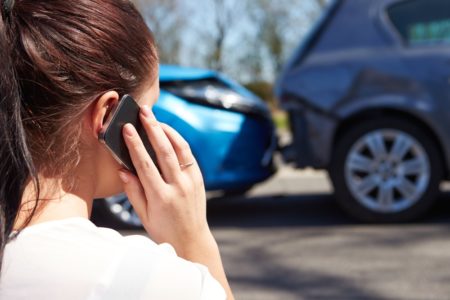After a car accident, you might not know what to expect regarding the events immediately after the accident, negotiating with insurers, and other aspects of the aftermath. If an accident occurs and a negligent driver or another party is behind it, you may be able to recover compensation. However, it would help if you also understood what to anticipate to prepare your case and make a full medical recovery.
Knowing how the claims process, seeking treatment, and other steps work after an accident will help you navigate the coming days, weeks, and years. Speaking with an experienced car accident lawyer is always in your best interest following an accident.
What Should You Do Immediately Following a Car Accident?

If you get into a car accident, you may not know what to expect soon afterward. In the event of a car accident, the following are some of the specific steps to take in the early days following an accident:
1. Seek Medical Care
The first step to take before building a case is to see a doctor. A medical professional can assess your injuries and help determine what type of treatment you’ll need. Regardless of the severity of your injuries, you’ll benefit from seeing a medical professional, as seemingly minor injuries could be more serious than they appear.
In addition to getting you started on recovery, seeking medical attention after an accident can help create medical records that prove an injury. These early records will also indicate to insurers that you didn’t delay in seeking a medical assessment and diagnosis, making it easier to tie your injuries to the accident.
2. Gather Important Evidence
In building a car accident case, you’ll also need to collect sufficient evidence from the scene of the accident and the resulting damages. For example, you should gather all medical records, bills for medical treatment, police reports, witness statements, photographic evidence of injuries, bills for vehicle repairs, and more.
If you cannot take photos or record video footage at the scene of the accident shortly after the accident occurs, you should return to the scene as soon as possible.
3. Speak With a Car Accident Lawyer
Your instinct might guide you to file a car accident claim. If your case involves damages and expenses, insurance companies will work hard to reduce your settlement or deny your insurance claim.
An attorney may be right for your case if you’re worried about insurance companies diminishing your case. A lawyer can meet in a free consultation and discuss your case, and he or she may be able to take on your case.
4. File Your Claim Before Time Runs Out
While the statute of limitations in your state may seem to give you plenty of time to file a claim, you won’t be able to recover compensation once this time passes, with a few rare exceptions. The statute of limitations tends to run between two to four years for negligence cases, including car accident cases.
For instance, the statute of limitations in New York is three years from the car accident, giving you three years to file a claim. This may seem like ample time, but it can quickly run out, leaving you with minimal options afterward. Also, as your medical bills begin to mount during recovery, it’s important to begin negotiations as soon as possible to seek a settlement that can compensate you for those bills.
What Should You Do in a No-Fault State?
If an accident takes place in a no-fault state, one step to take in most cases would be to file a claim with your own personal injury protection (PIP) insurance carrier. A PIP policy would cover compensation for medical bills and other types of economic losses sustained because of injuries in an accident. In a no-fault state, it doesn’t matter who was at fault for the accident insurers will pay compensation in many cases.
However, if your injuries are more serious to the point where PIP insurance alone won’t cover the damages, you may be able to file a third-party insurance claim against an at-fault driver or another responsible party.
What Will Happen to Your Vehicle After an Accident?
You may also wonder what will happen to your vehicle in the hours and days after an accident. Depending on the nature of the accident and the extent of the damage, there are a few things that could happen to your property:
A Towing Company Tows Your Vehicle
In some cases, cannot drive your vehicle after an accident, either because of your injuries, the damage to the vehicle, or for another reason, such as public safety. While the authorities may request a nearby towing company to collect your vehicle under certain circumstances, you’ll typically need to determine where to tow your vehicle, along with the costs of towing and storing your vehicle.
Additionally, you’ll need to figure out how to procure transportation while your vehicle is on the lot. You might need to consider a rental car, taxi cabs, ride-sharing, and other transportation expenses that can quickly add up.
The Vehicle Requires Repairs
Your vehicle will likely require repairs after an accident, which can be challenging to handle, especially if you need to recover from your injuries. Following the accident, you would need to determine where to get your repairs, the types of repairs you’ll require, and the cost of repairs while comparing estimates. You may also need to discuss repair costs with insurers to find out what they’ll cover.
In some cases, you may need to wait to receive insurance coverage until there’s a confirmed liable party. In the meantime, you would need to cover the costs of repairs yourself before a settlement helps cover them.
Your Vehicle Is Totaled
In many instances, a car accident totals a vehicle, which could mean a couple of things. Sometimes a totaled vehicle sustains damages to the point where it is irreparable. In other cases, a totaled vehicle is a vehicle with damage that exceeds a certain percentage of the vehicle’s value. If your vehicle falls under the second definition, you might need to decide whether it’s worth repairing or scrapping.
How Does the Third-Party Claims Process Work After a Car Accident?
If your plan is to file a third-party insurance claim against a negligent party’s insurance company, you may also want to know what to anticipate throughout the claims process. Keep in mind that car insurance claims can take a long time to settle, making it critical to file a claim quickly to begin the process and seek a settlement as soon as possible.
The following are a few of the main steps of a car insurance claim, which an experienced car accident lawyer may be able to help navigate:
1. Reaching out to the Insurance Company
The first step will entail contacting the liable party’s insurance carrier. You or your attorney would indicate that you wish to file a claim against the policyholder and provide specific details about the accident.
2. The Insurance Company May Choose to Investigate the Claim
Some cases may not involve an investigation from insurers. They may agree that the policyholder is liable and agree to a settlement. However, this is rarely how the case settles, as the insurance company is more likely to begin investigating the claim. This is often the case when a large settlement amount is at stake, and the company risks losing a lot of money on a payout.
During the investigation, the insurance company will look into the details of the accident and review the evidence, which will help determine fault. It will also look into the claimant to determine whether he or she is truthful about the claim and the nature of the injuries and damages sustained.
Throughout the investigation, it’s important to avoid certain interactions that might compromise your case. While the adjuster the insurer assigns to your case may appear friendly and eager to help you recover a fair settlement, the adjuster will look for any reason to reduce the settlement amount or deny your claim altogether.
These risks are why it’s important to avoid making any potentially problematic statements during negotiations, such as admitting fault or being inconsistent with your story. You’ll also want to avoid posting on social media until the investigation completes, seeing as a simple post may indicate that your injuries aren’t as serious as you claim them to be.
A car accident attorney may be able to help ensure you minimize the risk of compromising your case by preparing statements and providing advice throughout the claims process.
3. Receiving or Disputing the Settlement Offer
If you succeed with your claim, the third-party insurance company will pay out the settlement you deserve, and you can use this to cover medical expenses and other costs. However, the first settlement offer may not be what your case is worth, and you might be unaware of exactly how much you’re eligible to recover.
If you or your attorney believe the insurer’s settlement is too low, you can continue negotiating or dispute the initial judgment that the insurance company made. If negotiations fail to recover the settlement you deserve, you may be able to file a lawsuit against the negligent party.
Calculating Compensation Following an Accident
After an accident, you may be eligible to recover different types of compensation. There are many types of damages that can affect injury victims, including a variety of economic and non-economic damages. Following your accident, you’ll want to calculate the damages pertaining to your case, which can help you gauge how much you may recover in a car accident claim or lawsuit.
Economic Damages
The first type of damage to consider is economic or monetary. Also known as special damages, these damages relate to the costs associated with your injuries and property damage.
Examples of economic damages in car accident cases may include:
- Medical expenses resulting from immediate or ongoing care
- Ambulance transportation and hospitalization
- Lost wages resulting from time off from work to recover
- Lost earning capacity resulting from a disability
- Rehabilitation and physical therapy
- Occupational therapy
- Modifications made to homes or vehicles to accommodate disabilities
- The costs of hiring caregivers
These damages are relatively easy to calculate, but there may be many costs pertaining to your case that an attorney may help identify and quantify.
Non-Economic Damages
The other main type of damage is non-economic or non-monetary. These damages are also called general damages, and they account for the pain and suffering that injury victims experience after an accident.
Specific non-economic damages in car accident cases could include:
- Physical pain
- Psychological distress
- Trauma
- Post-traumatic Stress Disorder (PTSD)
- Disfigurement
- Loss of enjoyment of life
- Loss of companionship or consortium
While non-economic damages are more difficult to calculate than economic damages, there are certain ways to add them to a settlement amount. To help prove these damages, injury victims can keep a pain journal detailing their experience during recovery.
While rarely involved in car accident cases, punitive damages may also apply. Unlike compensatory economic and non-economic damages, the court awards these damages to deter defendants and others from committing acts of gross negligence by punishing defendants. A lawyer can help determine if these damages may apply to your case in addition to compensatory damages.
Connect With a Reputable Car Accident Lawyer
Connect car accident lawyer to maximize your chances of recovering compensation. To find out if you have a case that can benefit from the help of an attorney, consult an experienced lawyer today.

